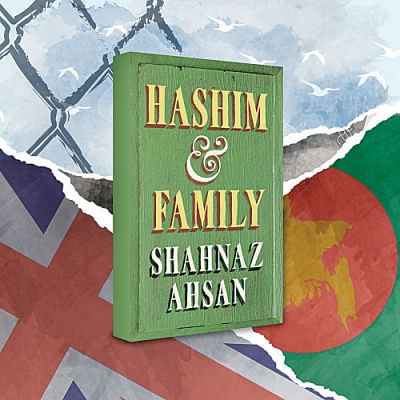Hashim & Family: A Sweeping Tale of Immigration and Family Ties

Hashim & Family (John Murray, 2020) takes us on a journey across two countries, spanning two decades. It begins with the titular Hashim moving from East Pakistan to Manchester in the 1960s in hopes of a better living, inspired by his cousin Rofikul, himself an immigrant of a few years. Hashim intends his stay in Britain to be temporary, but after he brings his wife Munira to live with him, they soon find themselves building a permanent life under the grey skies of Manchester.
While Ahsan begins the narrative within the narrow space of Hashim's Manchester family—Munira, Rofikul, Rofikul's partner Helen—she substantially widens it by switching gears to the liberation war of 1971. From an intimate account of immigrant life involving racism, linguistic and cultural adjustments, and the forging of new social bonds, we are transferred to the brutal and grotesque realities of war in East Pakistan. This juxtaposition is stark; it isn't always smooth but it is effective. The struggles of each group of characters in England and Bangladesh feel strikingly similar, as both fight to preserve their identities in the face of dominance, be it racist British locals or Pakistani usurpers.
It is this unapologetic portrayal of brutalities—both the racial tension and the war atrocities—that truly grips the reader. Ahsan does not shy away from bringing to life the violence faced by Bangladeshis both within and across borders.
What isn't as effective are her pacing and characterisation. The former feels uneven, particularly at first. While one wouldn't expect the story of an immigrant family to be enthralling from the start, it is definitely expected to touch one's emotional chords. This happens in minimal doses: we watch Hashim land in England in mismatched clothes, we watch his displeasure when Rofikul insists they take on "acceptable" British names like Ray and Harry, and we witness the two men facing a racist attack on Hashim's first night out in Manchester.
Munira, Hashim's wife, arrives as a better sketched out character, with real life inspiration drawn apparently from Ahsan's own grandmother. She is smart and well-read, she devours the likes of Charlotte Bronte and Louisa May Alcott, and this explains why so little about a new country surprises her. But the text only briefly describes her struggles adjusting to her new life. We do not see them unfold in real time, nor their effect on Munira.
Significantly more heartwarming is the instant camaraderie between Helen, Rofikul's Irish partner, and Munira, despite their initial insecurities. By leaving out potentially funny or awkward instances of culture shock and language barrier, however, Ahsan one again deprives us of the emotional payoff of seeing them slowly build this friendship.
The story gains pace when we fast forward to the liberation war, and this most compelling section showcases Ahsan's potential as a storyteller. She manages to capture the energy of the Bangladeshi community in London and her delineation of the situation back in Bangladesh has an impressive rawness to it. Ahsan's biggest triumph is that her characters feel innately Bangladeshi, be it through Hashim's diligence, Rofikul's restlessness, Munira's pragmatism, or Shapla's confidence. This is a rarity in stories written in English.
She also does an admirable job of creating strong female characters like Mala and Shapla, Rofikul's family back in Bangladesh, in addition to Munira and Helen. Mala is a victim of war brutalities, and Shapla her daughter. Each has her own struggles, but none of these women are shown to be weak at any moment, or defeated in the absence of men. Shapla particularly impresses with her maturity and strength of mind. But it is unfortunate that very few of these characters manage to create any lasting impact. Only Rofikul is written as a mysterious and convoluted character, but when the writer gives us a glimpse into his mind, his thoughts also come off as trite.
This debut novel is not without its flaws, but Shahnaz Ahsan's writing has plenty to offer. Her flowing prose is impressive with an ease and smoothness to it. Made a little sharper and tighter, it could do wonders. Hashim & Family is full of heart with family bonds at its core because it is a personal story inspired by Ahsan's own grandparents, who like Hashim and Munira, took the courageous decision to move to England from East Pakistan sometime in the 1950s. As a Bangladeshi reader, it was a treat to find the touch of my country in a British book. This novel definitely takes a step in the right direction for British-Bangladeshi storytelling.
Towrin Zaman is a moderator consultant who writes in her spare time.

 For all latest news, follow The Daily Star's Google News channel.
For all latest news, follow The Daily Star's Google News channel. 



Comments